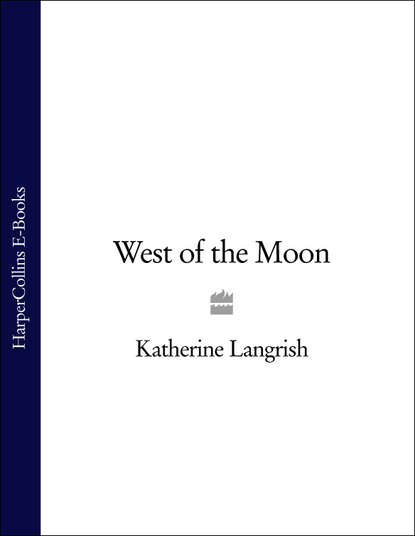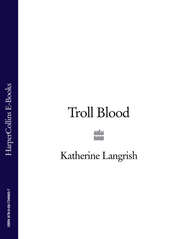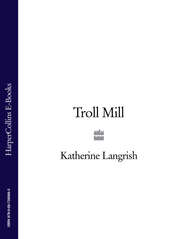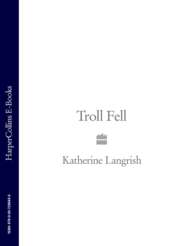По всем вопросам обращайтесь на: info@litportal.ru
(©) 2003-2024.
✖
West of the Moon
Настройки чтения
Размер шрифта
Высота строк
Поля
“They probably stole the broom too,” said Hilde. “You see, mother? It’s not so easy to keep out of trouble.”
“The varmints!” Eirik shook his head. “Worse than rats. They wouldn’t be so bold if my son was here: no, they wouldn’t come robbing us then!”
“They’re becoming a perfect plague,” said Gudrun.
“When I was a young fellow,” said Eirik gloomily, “I could have thrown anyone who so much as stepped on my shadow clean over the barn. No pack of trolls would have bothered me. Now I’m just a useless old man.”
“Nonsense,” Gudrun scolded him. “We need you very much, Eirik. We depend on you for – for wisdom, and advice.”
“Advice! Women never listen to advice,” scoffed Eirik, but he looked pleased.
“And stories! Tell us a story, Grandpa,” little Sigrid piped up from the floor where she was playing with the kitten. Eirik tugged her plait with his gnarled old hand.
“A story, missy? What is it to be about?”
“Trolls!” said her brother, Sigurd. The twins scrambled up and pressed close to Eirik’s knees.
“Let me think,” Eirik began. “Let me see. How about a story from a place far to the north, the wild mountains of the Dovrefell, where there are even more trolls than here? And some of them giants, by what I’ve heard!”
“Giants?” Sigurd’s eyes grew wide.
Eirik nodded. “Trolls come all sizes; and the one in this story was a big one, a little taller than a man. She was pretty, I daresay —”
“A pretty troll!” Sigrid interrupted, laughing.
“Yes, she had yellow hair and a nice long tail that wagged when she was happy. And she married a young farmer and wagged her tail at the wedding.”
Gudrun and Hilde were laughing now.
“Well, this young farmer’s friends and neighbours were disgusted. They thought he was out of his mind to go marrying a troll. They wouldn’t talk to his bride, or visit her. She sat by herself in her nice new house and was very lonely.”
“Poor troll,” said Sigrid.
“Huh,” said Sigurd. “I think he was stupid to marry a troll.”
“See what happened,” said Eirik. “One day, her father paid her a visit. He was a grim old troll from under the Dovrefell, and when he found his daughter sitting crying he said, ‘What’s all this?’” Eirik deepened his voice to a growl. “‘If your husband isn’t kind to you, I’ll tear his arms and legs off!’
“‘It’s the neighbours,’ said the troll bride. ‘They won’t have anything to do with me, and I’m so-o-o lonely!’
“‘Come with me,’ said her father, rolling up his sleeves, ‘and we’ll have a little game of catch.’
“The grim old troll went stamping round the village chasing people out of their houses, and when he got hold of them he threw them right over the Hall roof. And his daughter rushed around the other side and caught each one of them and put them back on their feet.
“When everyone in the village had been thrown over the Hall roof, the old troll shouted, ‘You’d better start being very nice to my daughter. Because if not,’ he glared, ‘if not, I’ll come back and play with you again – only, this time, my daughter will throw, and I will catch!’”
Sigrid looked puzzled. “I don’t understand,” she began.
“Do you think the old troll would really have caught them?” Hilde asked.
“Oh!” Sigrid’s face cleared. “He would have let them fall!”
“Or eaten them up,” said Sigurd with relish.
Eirik nodded. “So after that you’d never believe how polite the neighbours were. They called to see her every day and brought flowers and cakes and baskets of eggs. She was as happy as the day was long, and wagged her tail merrily. And that’s a story from the Dovrefell!” He smiled and stopped.
“Bedtime,” said Gudrun. As the twins hugged their grandfather and said goodnight, Hilde felt sudden sadness wash over her. If only Pa were here, she thought. But at least he’s alive. Not like Peer Ulfsson’s father. Poor Peer, he must hate living at the mill. I wonder what he’s doing right now?
Peer was eating his frugal supper. His uncles had given him some stale bread, a raw onion, a small piece of dry cheese and the end of a rancid sausage, and gone off somewhere taking Grendel with them, leaving Peer to mind the mill alone – except for Loki, who lay asleep by the fire...
The mill was noisily alive. Everything vibrated. The waterwheel thumped like a dark heart beating. The machinery clacked. Old dust trickled down the walls. Up in the loft, finely ground meal was snowing from the rim of the millstones and piling up on a wooden platform. Peer’s job was to climb the ladder from time to time and sweep it into sacks. It was dark up there, full of spooky shadows and old junk: worm-eaten cogwheels with half the teeth missing, a worn old millstone propped against the wall.
Peer gave the sausage to Loki and looked about, still hungry. The table was cluttered with dirty dishes, bacon rinds and crusts. On the floor by the fire his uncles had left a bowl full of cold, congealed groute, but it did not look very appetising.
I suppose that’s for the Nis, anyway, thought Peer. Even Grendel hasn’t touched it.
He prowled round the room. His uncles hadn’t said how late they’d be. He suspected they had gone out drinking. It was time to try and find where they had hidden his father’s money.
He lifted the lids of several wooden bins, built on either side of the ladder to the loft. Most were empty except for a few dusty grains at the bottom. One held a tangle of old leather harness. And one would not open. The lid was secured with an iron padlock. Peer rattled it. By the fire, Loki raised his head inquiringly. “I’m sure this is the one, Loki!” Peer told him. But knowing that did not help very much.
Reluctantly he climbed the rickety ladder to the grinding loft. A soft ring of flour encircled the millstones. Peer shovelled it into the waiting sack. He peeped into the hopper, which was getting low, and refilled it from a half-full sack of barley, which he could just lift. Pleased with himself, he was about to climb back down, when Loki leaped from his place by the fire and burst out barking, hackles up. Peer looked over the edge of the loft in alarm. Were his uncles coming back? Was it thieves?
Loki pranced, growling, then jumped and snapped at something above his head. He backed a few steps and barked some more, watching the rafters.
Peer slid down the ladder. “Loki, shut up! It’s only a rat.” And he sat on the dirty rush mat and reached out his hands to the fire. Slowly his eyes closed. His head nodded forwards. But Loki barked again, and he sat up with a jerk.
“Stop it!” he complained. Loki flung him an apologetic glance but continued to stand braced and staring upwards. Peer’s head drooped again, but as his eyelids closed he heard a familiar voice. “See my leg?” it giggled. There was another flurry of barks from Loki, who jumped about as if on springs.
Peer’s eyes flew wide. By the flickering firelight he saw something sitting on one of the cross beams. A spindly little leg covered in a worn grey stocking dangled temptingly just over Loki’s head.
“See my little leg?” teased the voice again. Loki leaped again in frustrated frenzy.
“It’s only the Nis, silly!” Peer got up and grabbed his pet, closing his hand around Loki’s muzzle to keep his mouth shut. “Now be quiet.” He stared up into the beams. The leg had been withdrawn. He could just see a dim shape sitting with its arms wrapped round its knees. “Hello!” he said.
“You spoiled the fun,” the Nis sulked.
“I’m sorry.”
The Nis shuffled round on the beam till it had its back turned.
“How’s the groute this evening? Have they given you any butter?” asked Peer cunningly. The Nis came to life at once.
“I doesn’t know, Peer Ulfsson. Has they? Let’s see.”
It ran briskly along the beam and down the wall like a big spider. Peer watched, delighted. It was a little grey, whiskery thing with big hands and long knobbly fingers. Its ragged grey clothing seemed part of it, but it wore a little red cap on its head. Loki backed away grumbling.
The Nis scampered to the bowl of groute and lifted it. “Cold!” it muttered. “Cold as their cruel hearts, and lumpy, too!” It stirred the bowl, scooping up the groute in messy splodges, then sat distastefully licking its fingers.
“Was there any butter?” asked Peer. The Nis shook its head.









